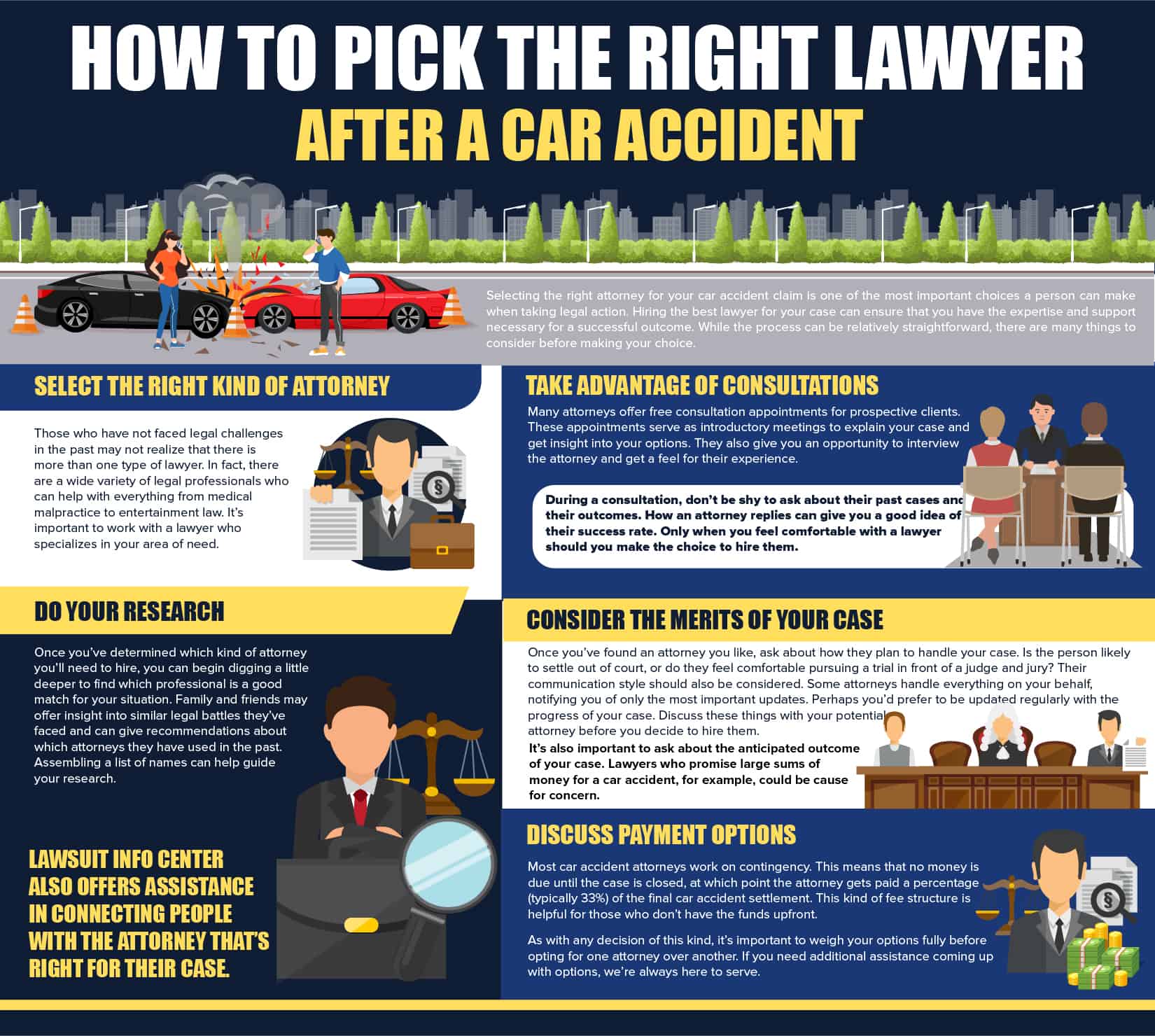lawyer fee accident settlement
Dealing with an accident settlement can be stressful. Understanding lawyer fees is crucial.
Accidents can upend your life, leading to financial strain. Hiring a lawyer to handle your settlement may seem like an added burden. Yet, it can actually ease the process and potentially maximize your compensation. Knowing how lawyer fees work can help you make an informed decision.
This blog post will break down the different types of lawyer fees and how they impact your accident settlement. By understanding these details, you can feel more confident in navigating your legal options. Let’s explore what you need to know about lawyer fees in accident settlements.

Credit: www.lilawyer.com
Introduction To Accident Settlements
Accident settlements can be complicated. They involve negotiations between the injured party and the insurance company. The goal is to reach a fair compensation for injuries and damages. Understanding the basics can help you navigate this process better.
Importance Of Legal Representation
Having a lawyer by your side is crucial. They understand the law and can negotiate effectively. Legal representation ensures you get the best possible settlement. Lawyers know the value of your claim and can fight for your rights.
Without a lawyer, you might accept a lower offer. Insurance companies often try to minimize payouts. A lawyer protects your interests and helps you get fair compensation.
Common Types Of Accident Claims
There are many types of accident claims. Each has its own process and requirements. Here are some common types:
- Car accidents: These are the most common. They involve collisions between vehicles.
- Slip and fall: These happen when someone falls due to unsafe conditions.
- Workplace accidents: Injuries that occur while on the job.
- Medical malpractice: Injuries caused by medical errors.
- Product liability: Injuries from defective products.
Each type requires different evidence and legal strategies. Understanding the nature of your claim can help you prepare better.

Credit: www.eastonlawoffices.com
Understanding Lawyer Fees
Understanding lawyer fees is essential when dealing with accident settlements. Knowing how lawyers charge can help you decide the best option for your case. There are different ways lawyers charge for their services. Here, we will explore some common fee structures.
Contingency Fees Explained
Many lawyers use contingency fees for accident cases. This means you pay the lawyer only if you win the case. The fee is a percentage of your settlement. This can range from 25% to 40%.
Here is a simple breakdown of how contingency fees work:
- You agree on a percentage with your lawyer.
- If you win, the lawyer takes that percentage from your settlement.
- If you lose, you do not owe the lawyer any fee.
This fee structure is beneficial if you do not have money to pay upfront. It also motivates the lawyer to win the case.
Hourly Rates Vs. Flat Fees
Some lawyers charge by the hour. This is known as an hourly rate. You pay for the time the lawyer spends on your case. Here is a comparison:
| Hourly Rates | Flat Fees |
|---|---|
| Pay per hour of work | Pay a set amount |
| Can be more expensive if the case takes long | Know the total cost upfront |
| Lawyer keeps detailed timesheets | One-time payment covers the entire case |
Flat fees are another option. You pay a fixed amount for the entire case. This can be useful for simple cases with predictable outcomes.
Each fee structure has its pros and cons. Choose the one that best suits your financial situation and case complexity.
Choosing The Right Lawyer
Selecting the right lawyer for an accident settlement can be overwhelming. The right choice can make a significant difference in your case outcome. It’s crucial to consider various factors to ensure you get the best representation.
Qualifications To Look For
When choosing a lawyer, prioritize their qualifications. Look for:
- Experience in accident settlements
- Relevant educational background
- Positive track record
- State bar association membership
Experienced lawyers understand the nuances of accident cases. They have handled similar cases and know the legal landscape. Their educational background should reflect a strong foundation in law. A positive track record indicates past success in similar cases.
Questions To Ask During Consultation
During your consultation, ask these important questions:
- How many accident settlement cases have you handled?
- What is your success rate?
- How do you charge for your services?
- Can you provide references?
- What is your approach to handling my case?
Understanding the lawyer’s experience and success rate helps in making an informed decision. Fee structure clarity is crucial to avoid unexpected costs. References offer insights into the lawyer’s credibility. The lawyer’s approach should align with your expectations and needs.
Building A Strong Case
Building a strong case is vital for a successful accident settlement. A well-prepared case can make the difference in the outcome. It helps in securing the best possible compensation. To build a strong case, thorough preparation is necessary. This includes gathering evidence and documenting injuries and damages.
Gathering Evidence
Gathering evidence is the first step in building a strong case. Evidence supports your claims and strengthens your position. Start by collecting any available photos and videos of the accident scene. These visuals provide a clear picture of the incident. Also, obtain witness statements. Witnesses can offer valuable information that may support your case.
Police reports are also crucial. They often contain important details about the accident. Don’t forget about medical records. These records document the injuries sustained in the accident. The more evidence you have, the stronger your case will be.
Documenting Injuries And Damages
Documenting injuries and damages is another important aspect. This process begins with seeking medical attention immediately after the accident. A doctor’s report will be key evidence. It outlines the extent of your injuries.
Keep detailed records of all medical treatments. Include doctor’s visits, prescriptions, and physical therapy sessions. Also, document any lost wages due to the accident. This includes missed workdays and reduced earning capacity.
Don’t forget to record any other damages. This might include vehicle repairs and other property damage. Keeping thorough documentation helps ensure you receive fair compensation.
Negotiating With Insurance Companies
Negotiating with insurance companies can be challenging after an accident. They aim to minimize payouts, while you seek fair compensation. Knowing how to approach this negotiation is crucial.
Preparation Tips
Preparation is key to a successful negotiation. Gather all necessary documents, including medical records, police reports, and repair estimates. Have a clear understanding of your claim’s value.
Stay organized. Create a file for all correspondence and documents related to your case. This will help you stay on track.
Know your policy. Understand what your insurance covers and what it does not. This will help you avoid misunderstandings and unrealistic expectations.
Common Tactics Used By Insurers
Insurance companies often use tactics to reduce their payout. One common tactic is delaying the process. They hope you will accept a lower offer out of frustration.
Another tactic is disputing the severity of your injuries. They may downplay your injuries to justify a lower settlement.
They might also question the necessity of your medical treatments. They will argue that some treatments were unnecessary or unrelated to the accident.
Being aware of these tactics can help you stay firm and focused. Stay patient and persistent. Your goal is to get a fair settlement.
Maximizing Your Compensation
Maximizing your compensation after an accident is crucial. It ensures you receive the full amount you deserve. Understanding how to calculate damages, consider future costs, and account for long-term impact is essential. This section will guide you through these aspects.
Calculating Damages
Calculating damages involves understanding different types of losses. These include:
- Medical Expenses: All medical costs related to the accident.
- Lost Wages: Income lost due to inability to work.
- Property Damage: Repair or replacement costs of damaged property.
- Pain and Suffering: Compensation for physical and emotional distress.
Each of these categories contributes to your total compensation. Ensure you document all expenses and losses. This will help in calculating accurate damages.
Future Costs And Long-term Impact
Future costs and long-term impacts can significantly affect your settlement. Consider the following:
- Ongoing Medical Treatment: Future medical care needs and their costs.
- Rehabilitation: Costs for physical or occupational therapy.
- Permanent Disability: Compensation for long-term disabilities.
- Reduced Earning Capacity: Impact on your ability to earn in the future.
These factors ensure your settlement covers all potential future expenses. Evaluating long-term impacts is crucial for fair compensation.
By understanding and calculating these elements, you can maximize your accident settlement. Ensure all damages and future costs are accounted for. This will help you receive the compensation you deserve.
The Settlement Process
The settlement process is crucial in accident cases. It helps victims get compensation for their injuries and losses. This process can be complex but understanding it helps manage expectations and reduces stress.
Steps Involved
The settlement process involves several key steps. Each step is important for a fair outcome.
- Consultation: Meet with a lawyer to discuss the accident.
- Investigation: Your lawyer will gather evidence and review the case.
- Filing a Claim: Your lawyer files a claim against the responsible party.
- Negotiation: Both sides try to agree on a settlement amount.
- Settlement Agreement: If both sides agree, they sign a settlement document.
- Receiving Payment: The agreed amount is paid to you.
Timeline Expectations
The settlement process timeline can vary. Some cases settle quickly, while others take longer.
| Step | Estimated Time |
|---|---|
| Consultation | 1-2 weeks |
| Investigation | 1-3 months |
| Filing a Claim | 1 month |
| Negotiation | Several weeks to months |
| Settlement Agreement | 1-2 weeks |
| Receiving Payment | 1-2 months |
Each step can vary depending on the case’s complexity. Working closely with your lawyer helps ensure a smooth process.
When To Consider Going To Trial
Deciding whether to settle or go to trial after an accident can be tough. It involves weighing many factors. Understanding the pros and cons of each option will help you make an informed decision. Let’s dive into when you should consider going to trial.
Pros And Cons
Pros:
- Higher Compensation: Trials can sometimes lead to larger settlements.
- Public Record: A trial is a public event, providing a formal record of the case.
- Justice: Trials can provide a sense of justice and closure.
Cons:
- Time-Consuming: Trials can take months or even years to resolve.
- Costly: Legal fees can add up quickly during a trial.
- Uncertain Outcome: There is no guarantee of winning in court.
Factors To Consider
When deciding to go to trial, consider these factors:
| Factor | Details |
|---|---|
| Case Strength | Evaluate the strength of your evidence and testimony. |
| Settlement Offer | Compare the settlement offer to your estimated trial award. |
| Financial Situation | Assess if you can afford the costs of a trial. |
| Time | Consider if you can wait for a trial resolution. |
Making the decision to go to trial is significant. Weigh the pros and cons, and consider all factors before proceeding. Consulting with a lawyer can provide valuable guidance in this complex process.

Credit: rosesanderslaw.com
Frequently Asked Questions
What Factors Determine Lawyer Fees For Accident Settlements?
Lawyer fees for accident settlements depend on case complexity, lawyer’s experience, and time spent on the case. Fees are often a percentage of the settlement.
Are Lawyer Fees Deducted From The Settlement Amount?
Yes, lawyer fees are typically deducted from the settlement amount. This is usually agreed upon in a contingency fee arrangement.
Can Lawyer Fees Be Negotiated?
Yes, lawyer fees can often be negotiated. It’s important to discuss fees upfront and understand all associated costs before hiring a lawyer.
How Do Contingency Fees Work In Accident Settlements?
Contingency fees mean the lawyer gets paid only if you win the case. They take a percentage of the settlement amount as their fee.
Conclusion
Settling accident claims can feel overwhelming. Hiring a lawyer simplifies the process. Legal fees may seem high, but they ensure proper compensation. Lawyers handle paperwork and negotiations. This reduces your stress. They advocate for your best interests. Their expertise increases your chances of fair settlement.
Always choose a lawyer with experience in accident cases. This makes a difference. Remember, a good lawyer is an investment in your peace of mind.

Leave a Reply